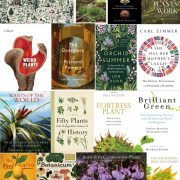Book Reccomendations – Professional Development
A list of book recommendations from our community with a focus on Professional Development
Research Skills
At the Bench: A Laboratory Navigator by Kathy Barker (2004)
At the Bench is the unique and hugely successful handbook for living and working in the laboratory, an essential aid to understanding basic lab techniques and how research groups work at a human level. – Goodreads

At the Helm: A Laboratory Navigator by Kathy Barker (2001)

The Productive Researcher by Mark S. Reed (2017)
In The Productive Researcher, Mark Reed shows researchers how they can become more productive in a fraction of their current working day. He draws on interviews with some of the world’s highest performing researchers, the literature and his own experience to identify a small number of important insights that can transform how researchers work. – Goodreads

Laboratory Life: The Construction of Scientific Facts by Bruno Latour, Steve Woolgar, Jonas Salk (Editor) (1979)
This highly original work presents laboratory science in a deliberately skeptical way: as an anthropological approach to the culture of the scientist.- Goodreads

Experimental Design for Laboratory Biologists: Maximising Information and Improving Reproducibility by Stanley E Lazic (2017)
Specifically intended for lab-based biomedical researchers, this practical guide shows how to design experiments that are reproducible, with low bias, high precision, and widely applicable results. – Goodreads

Statistics Explained: An Introductory Guide for Life Scientist by Steve McKillup (2006)
Statistics Explained is a reader-friendly introduction to experimental design and statistics for undergraduate students in the life sciences, particularly those who do not have a strong mathematical background. – Goodreads

A Field Guide to Lies and Statistics: A Neuroscientist on How to Make Sense of a Complex World by Daniel J. Levitin (2016)
Acclaimed neuroscientist Daniel Levitin shows us how learning to understand statistics will enable you to make quicker, better-informed decisions to simplify your life. – Goodreads
“Very informative on misleading statistics. The pages turn themselves” @YTamzin via twitter

R for Data Science by Garrett Grolemund and Hadley Wickham (2017) (Free Online)
This book will teach you how to do data science with R: You’ll learn how to get your data into R, get it into the most useful structure, transform it, visualise it and model it. In this book, you will find a practicum of skills for data science. – Quote from Introduction
/preview.png)
Management/Leadership Skills
Management and Organisational Behaviour by Laurie J. Mullins (2005)
Presenting a managerial approach to the study of organisational behaviour, with an emphasis on improving working performance through a better understanding of human resources, this book contains summaries, review questions and assignments. – Goodreads
/preview.png)
The 7 Habits of Highly Effective People: Powerful Lessons in Personal Change by Stephen R. Covey (2004)
/preview.png)
Understanding Organizations by Charles B. Handy (1993)
Organizations are a part of everyday life, whether in schools, hospitals, police stations or commercial companies. In this classics text, Charles Handy argues that the key to successful organizations lies in a better understanding of the needs and motivations of the people within them. – Goodreads
/preview.png)
ARC Leadership: From Surviving to Thriving in a Complex World by Richard Boston, Peter Hawkins (2014)
“At all levels and in all organisations, leaders face a rising tide of mistrust in a world that’s increasingly complex and interconnected. If they are to survive and thrive, these leaders, their teams and their organisations are going to need to be simultaneously Authentic, Responsible and Courageous.” – Goodreads
/preview.png)
Making the Right Moves: A Practical Guide to Scientific Management for Postdocs and New Faculty by Burroughs Wellcome Fund, Howard Hughes Medical Institute (2004)
Making the Right Moves is a collection of practical advice, experiences, and opinions from seasoned biomedical investigators and other professionals. – Goodreads
“It is always good to know what engine keeps science running. This anthropology of science eloquently reveals it.” @b_penders via Twitter
/preview.png)
Career Prep
Tomorrow’s Professor: Preparing for Careers in Science and Engineering by Richard M. Reis (1997)
Tomorrow’s Professor is designed to help you prepare for, find, and succeed at academic careers in science and engineering. It looks at the full range of North American four-year academic institutions while featuring 30 vignettes and more than 50 individual stories that bring to life the principles and strategies outlined in the book. – Goodreads
/preview.png)
A PhD Is Not Enough: A Guide To Survival In Science by Peter J. Feibelman (1993)
This exceptional volume explains what stands between you and fulfilling long-term research career. Bringing the key survival skills into focus, A Ph.D. Is Not Enough! proposes a rational approach to establishing yourself as a scientist. – Goodreads
/preview.png)
Advice for a Young Investigator by Santiago Ramón y Cajal (2004)
/preview.png)
Communication
Making Genes, Making Waves: A Social Activist in Science by Jon Beckwith (2002)
Jon Beckwith’s book, the story of a scientific life on the front line, traces one remarkable man’s dual commitment to scientific research and social responsibility over the course of a career spanning most of the postwar history of genetics and molecular biology. – Goodreads
/preview.png)
If I Understood You, Would I Have This Look on My Face?: My Adventures in the Art and Science of Relating and Communicating by Alan Alda (2017)
Alan Alda, the award-winning actor and bestselling author, tells us the fascinating story of his quest to learn how to communicate better, and to teach others to do the same.
/preview.png)
Even a Geek Can Speak: Low-Tech Presentation Skills for High-Tech People by Joey Asher (2006)
In today’s high-tech world, it’s cool to be a geek. But it’s not cool to talk like a geek. Even a Geek Can Speak shows anyone how to express complex ideas in ways that are simple, that connect with listeners, and that persuade. – Goodreads
/preview.png)
Teaching
How to Teach Programming (And Other Things) by Greg Wilson (2017)
“Contains a mountain of recent peer-reviewed research on what works in teaching (and community building!) and what doesn’t. Lots of good stuff in there even if you’re teaching something else. (Free online)” @PhilippBayer via Plantae
/preview.png)
Writing
Writing that Works by Kenneth Roman (2000)
“This one comes from the business/advertising world and was originally about how to get your company-internal memos as clear as possible, then it was updated over the years to include emails etc. It’s very good advice on clear writing when communicating via email.” @PhilippBayer via Plantae
/preview.png)









Leave a Reply
Want to join the discussion?Feel free to contribute!